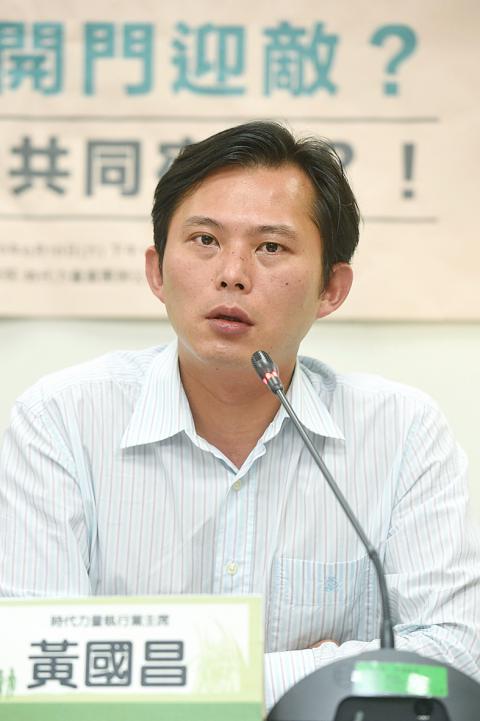Chinese investment in MediaTek Inc (聯發科), a leading handset chipmaker, should be blocked to prevent technology transfer, New Power Party (NPP) legislators, an academic and members of the Economic Democracy Union said yesterday, adding that any exceptions made for the firm would set a dangerous precedent.
“Our semiconductor design industry has a large market in China and it faces a huge amount of pressure to allow direct Chinese investment. Taiwanese government regulations are their strongest defense, because it enables them to tell Chinese firms that no is no and there is nothing they can do,” NPP Executive Chairman Huang Kuo-chang (黃國昌) said.
While most firms in the industry have not publically expressed opposition to the MediaTek deal to avoid Chinese retaliation, many are opposed, because the precedent would lead to further pressure to allow technology transfers by accepting direct investment, Huang said.

Photo: George Tsorng, Taipei Times
“Opening up to Chinese investment is not motivated by a need for capital — our semiconductor industry does not lack for capital. China’s objective is to use direct investment to secure technology transfers,” he said.
“Semiconductor firms should keep in mind the amount of public resources that were invested into nurturing the industry and put national interests before short-term profit,” Huang added.
MediaTek chairman Tsai Ming-kai (蔡明介) has pushed for a conditional relaxation of the ban on Chinese firms making equity investments in local chip designers as a means to gain greater market share in China and the opportunity to participate in the drafting of 5G wireless regulatory standards.
National Sun Yat-sen University sociology professor Tsai Hung-cheng (蔡宏政) questioned whether Chinese investment would guarantee the firm a role in the drafting of the standards, given China’s lack of proprietary technology.
“The only way the Chinese will make rapid progress in the sector is if they have Taiwanese technology — their primary motivation for investment [in MediaTek] is to make a breakthrough,” he said, adding that any concessions would be met with further Chinese demands for board seats and the establishment of research and development centers in China.
“The government must be proactive and prevent companies from acting purely for their individual interests, because China is willing to give the first firm [that pushes for allowing investment] rich incentives to make the breakthrough possible,” Tsai Hung-cheng said.
Economic Democracy Union convener Lai Chung-chiang (賴中強) rejected assertions that technology transfers could be averted as long as Chinese firms are banned from having board seats in Taiwanese corporations.
“Investing firms would wield significant power as major customers and investors, with the full weight of Chinese government capital to back them up. All they have to do to gain access to technology is demand that Chinese and Taiwanese teams collaborate on product innovations,” he said, adding that there is overly broad executive discretion to approve Chinese investment, given the lack of national regulations.
The Economic Democracy Union is a consortium of nongovernmental organizations that played a central role in organizing initial opposition to the cross-strait service trade agreement.

Taiwanese Olympic badminton men’s doubles gold medalist Wang Chi-lin (王齊麟) and his new partner, Chiu Hsiang-chieh (邱相榤), clinched the men’s doubles title at the Yonex Taipei Open yesterday, becoming the second Taiwanese team to win a title in the tournament. Ranked 19th in the world, the Taiwanese duo defeated Kang Min-hyuk and Ki Dong-ju of South Korea 21-18, 21-15 in a pulsating 43-minute final to clinch their first doubles title after teaming up last year. Wang, the men’s doubles gold medalist at the 2020 and 2024 Olympics, partnered with Chiu in August last year after the retirement of his teammate Lee Yang

FALSE DOCUMENTS? Actor William Liao said he was ‘voluntarily cooperating’ with police after a suspect was accused of helping to produce false medical certificates Police yesterday questioned at least six entertainers amid allegations of evasion of compulsory military service, with Lee Chuan (李銓), a member of boy band Choc7 (超克7), and actor Daniel Chen (陳大天) among those summoned. The New Taipei City District Prosecutors’ Office in January launched an investigation into a group that was allegedly helping men dodge compulsory military service using falsified medical documents. Actor Darren Wang (王大陸) has been accused of being one of the group’s clients. As the investigation expanded, investigators at New Taipei City’s Yonghe Precinct said that other entertainers commissioned the group to obtain false documents. The main suspect, a man surnamed

US Secretary of the Treasury Scott Bessent and US Trade Representative Jamieson Greer began talks with high-ranking Chinese officials in Switzerland yesterday aiming to de-escalate a dispute that threatens to cut off trade between the world’s two biggest economies and damage the global economy. The US delegation has begun meetings in Geneva with a Chinese delegation led by Chinese Vice Premier He Lifeng (何立峰), Xinhua News Agency said. Diplomats from both sides also confirmed that the talks have begun, but spoke anonymously and the exact location of the talks was not made public. Prospects for a major breakthrough appear dim, but there is

The number of births in Taiwan fell to an all-time monthly low last month, while the population declined for the 16th consecutive month, Ministry of the Interior data released on Friday showed. The number of newborns totaled 8,684, which is 704 births fewer than in March and the lowest monthly figure on record, the ministry said. That is equivalent to roughly one baby born every five minutes and an annual crude birthrate of 4.52 per 1,000 people, the ministry added. Meanwhile, 17,205 deaths were recorded, resulting in a natural population decrease of 8,521, the data showed. More people are also leaving Taiwan, with net